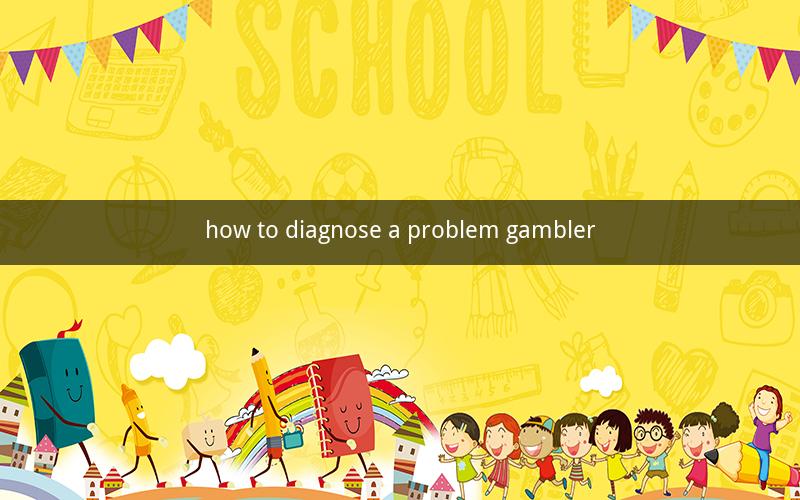
Contents
1. Understanding Problem Gambling
2. Identifying Problem Gambling
3. Signs and Symptoms of Problem Gambling
4. Assessing Problem Gambling Severity
5. Professional Help for Problem Gamblers
6. Support Systems for Problem Gamblers
7. The Role of Family and Friends
8. Treatment Approaches for Problem Gambling
9. Preventing Problem Gambling
10. The Importance of Education
1. Understanding Problem Gambling
Problem gambling, also known as gambling disorder, is a behavioral addiction characterized by an inability to control gambling behavior, leading to significant harm or distress. It is essential to recognize that problem gambling is a real and serious issue that can affect individuals, families, and communities.
2. Identifying Problem Gambling
Identifying problem gambling may not always be straightforward. However, there are several indicators that can help determine if someone is struggling with this issue:
- Persistent desire to gamble, regardless of the consequences
- Repeated failed attempts to stop or control gambling
- Spending more time and money on gambling than intended
- Neglecting responsibilities or personal relationships due to gambling
- Continual pursuit of "one more win" to recoup losses
- Risking or losing personal, professional, or educational opportunities due to gambling
3. Signs and Symptoms of Problem Gambling
The signs and symptoms of problem gambling can vary from person to person. However, common indicators include:
- Financial problems, such as unpaid bills, loans, or debt
- Legal issues, such as arrests or citations related to gambling
- Lying or hiding gambling activities from family and friends
- Emotional distress, such as anxiety, depression, or mood swings
- Physical health issues, such as headaches, stomachaches, or insomnia
4. Assessing Problem Gambling Severity
Assessing the severity of problem gambling can help determine the appropriate level of intervention. The following criteria can be used to categorize problem gambling severity:
- Mild: Occasional gambling, but it has not caused significant harm.
- Moderate: Gambling has caused some harm, but not severe.
- Severe: Gambling has caused significant harm to the individual, family, or community.
5. Professional Help for Problem Gamblers
Seeking professional help is crucial for individuals struggling with problem gambling. Therapists, counselors, and addiction specialists can provide tailored treatment plans to address the underlying issues and help individuals regain control over their lives.
6. Support Systems for Problem Gamblers
Support systems, such as family, friends, and support groups, can play a vital role in the recovery process. Encouraging open communication, providing emotional support, and helping individuals develop healthy coping mechanisms are essential for long-term recovery.
7. The Role of Family and Friends
Family and friends can significantly impact an individual's recovery journey. It is essential to:
- Offer unconditional support and understanding
- Encourage the individual to seek professional help
- Participate in family therapy or counseling sessions
- Support the individual's efforts to develop healthy coping mechanisms
8. Treatment Approaches for Problem Gambling
Several treatment approaches are available for problem gambling, including:
- Cognitive-behavioral therapy (CBT): Helps individuals identify and change negative thoughts and behaviors related to gambling.
- Contingency management: Provides rewards for staying away from gambling or engaging in healthy activities.
- Motivational interviewing: Helps individuals explore their readiness to change and develop a plan for recovery.
- Support groups: Offer a sense of community and support for individuals struggling with problem gambling.
9. Preventing Problem Gambling
Preventing problem gambling involves:
- Educating individuals about the risks and consequences of gambling
- Encouraging responsible gambling practices
- Implementing gambling addiction prevention programs in schools and communities
- Monitoring and regulating gambling activities
10. The Importance of Education
Education plays a crucial role in preventing and addressing problem gambling. By raising awareness about the risks and consequences of gambling, individuals can make informed decisions and seek help if needed.
Questions and Answers
1. What is the difference between problem gambling and gambling addiction?
- Problem gambling refers to any form of gambling that causes harm or distress, while gambling addiction is a severe form of problem gambling characterized by an inability to control gambling behavior.
2. Can problem gambling affect anyone?
- Yes, problem gambling can affect individuals of all ages, genders, and backgrounds.
3. How can I help a friend or family member with problem gambling?
- Offer unconditional support, encourage them to seek professional help, and participate in family therapy or counseling sessions.
4. Are there any medications available to treat problem gambling?
- Currently, there are no FDA-approved medications specifically for treating problem gambling. However, some medications may be used to manage associated symptoms, such as depression or anxiety.
5. Can problem gambling lead to other mental health issues?
- Yes, problem gambling can lead to a range of mental health issues, including depression, anxiety, and substance abuse.
6. How can I recognize the signs of problem gambling in myself?
- Pay attention to changes in your financial situation, relationships, and overall well-being. If you find yourself spending more time and money on gambling, or neglecting responsibilities, it may be a sign of problem gambling.
7. Can problem gambling be cured?
- Problem gambling can be treated and managed effectively. With the right support and treatment, individuals can overcome their addiction and lead a healthy, fulfilling life.
8. Are there any support groups available for problem gamblers?
- Yes, there are numerous support groups, such as Gamblers Anonymous and Gam-Anon, that provide support and resources for individuals struggling with problem gambling and their families.
9. How can I prevent problem gambling in my community?
- Educate individuals about the risks of gambling, encourage responsible gambling practices, and implement gambling addiction prevention programs in schools and communities.
10. Can technology help in preventing problem gambling?
- Yes, technology can play a role in preventing problem gambling. Tools such as gambling blocking software and self-exclusion programs can help individuals control their gambling behavior.